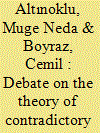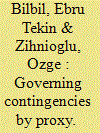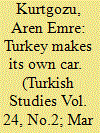|
|
|
Sort Order |
|
|
|
Items / Page
|
|
|
|
|
|
|
| Srl | Item |
| 1 |
ID:
190695


|
|
|
|
|
| Summary/Abstract |
The global economic crisis and the associated economic downturn in Turkey revitalized debates about the theory and politics of the middle classes. The significance of the middle classes has historically been shaped by not only the ‘declining’ boundaries of their objective class position but also their ‘rising’ importance in the reproduction of capital accumulation and hegemonic relations. Inspired by the notion of ‘contradictory class locations’ offered by Erik Olin Wright to make sense of the growing middle class of nonmanual labor in contemporary capitalist societies, and with a particular focus on Turkey’s hardware sector and small traders in the Karaköy region, this article addresses the specific historical conditions of these small traders' class formation and analyzes their experiences with changing market conditions, their approaches to the functioning of market mechanisms, and the role of the state, as well as forms of their political representation.
|
|
|
|
|
|
|
|
|
|
|
|
|
|
|
|
| 2 |
ID:
190694


|
|
|
|
|
| Summary/Abstract |
Contingencies comprise immediate possibilities and aleatory interactions in the form of calculated responses to mutual uncertainties. While contingencies are critically important to governmental policies, yet they have been rarely considered in social analysis. The aim of this study is to analyze how the Covid-19 pandemic as a crisis has been governed both against and through contingencies by investigating the social support measures initiated by the Turkish government and the Istanbul Metropolitan Municipality (IMM). We gathered empirical data qualitatively from 12 in-depth interviews with the officers of local government and NGOs, supplemented by official documents. We found that contingencies are produced and become residual through configurational interdependencies, such as competition between the central and local government, unemployment, inadequate support, standardization, path dependency, and lack of diversification in need assessment. This study revealed that governmental practices are governed through contingent possibilities and interactions under mutual uncertainty and the politics of crisis management and conflict between local and central authority changed social support mechanisms.
|
|
|
|
|
|
|
|
|
|
|
|
|
|
|
|
| 3 |
ID:
190693


|
|
|
|
|
| Summary/Abstract |
This paper focuses on the history of Turkey’s efforts to establish a national automotive industry, which culminated in a state-driven project to build a Turkish automobile, the Devrim (Revolution), in 1961. The outcome of the project was three prototypes unveiled in Republic Day ceremonies, but quickly left in oblivion afterwards. This paper investigates the possible causes of the termination of the project, arguing that building a Turkish car had great symbolic significance for the identity of a nation in the quest for modernization and Westernization. The project was difficult to sustain considering the vexed political and ideological motivations invested in it.
|
|
|
|
|
|
|
|
|
|
|
|
|
|
|
|
| 4 |
ID:
190690


|
|
|
|
|
| Summary/Abstract |
This article employs regressive and spatial analyses to understand the correlates of the CHP’s electoral support from the first competitive elections in 1950 to the present. We find that despite some continuities in its constituency, the CHP’s voter base has changed significantly with regards to key political and social dynamics such as the Kurdish vote, effective number of parties, and urbanization. The findings give credence to the role of political leadership as well as the evolutionary capability of the party, both of which can have important implications regarding the future electoral trajectory of the party and of Turkey’s political regime.
|
|
|
|
|
|
|
|
|
|
|
|
|
|
|
|
| 5 |
ID:
190692


|
|
|
|
|
| Summary/Abstract |
This study scrutinizes the relations between the cooperative societies and the ruling party in Turkey in the 1930s. The ruling party (the Republican Peoples’ Party) mobilized the cooperative societies to avert the subversive effects of the Great Depression. Besides their economic significance, cooperative societies were formulated as alternative communication channels between the ruler and the ruled. It is argued that under the single party regime the RPP generated a regimented public sphere over these organizations to forward its messages to the masses. The periodicals published by the Turkish Cooperatives Society, the national federation of the cooperatives, provide invaluable insights into the catalyzer role of the bureaucratic intelligentsia in the construction and deconstruction of this public sphere. It is suggested that the interactions between the ruling authority and the bureaucratic intelligentsia generate a certain pattern of political culture displaying the dialectical forces immanent to any public sphere.
|
|
|
|
|
|
|
|
|
|
|
|
|
|
|
|
| 6 |
ID:
190696


|
|
|
|
|
| Summary/Abstract |
Turkey has experienced a radical political transformation within the last decade. The promising reforms of the Justice and Development Party (AKP) in its early years have gradually given way to autocratic politics. The transition to a presidential regime has further widened the executive’s control over the institutional checks and bureaucratic accountability mechanisms. Yet, the Court of Auditors – Turkey’s supreme audit institution – has continued to publish audit reports on numerous institutions, including AKP-run municipalities and private companies owned by AKP supporters, and revealed corruption, waste and irregularities in public spending. This article argues when certain domestic conditions (censored public servants, co-opted mainstream media, and suppressed opposition) are met, bureaucracy can function in autocratizing regimes since it does not generate political power costs for the government, but instead provides legitimacy to the incumbents in the international institutions of the liberal democratic order.
|
|
|
|
|
|
|
|
|
|
|
|
|
|
|
|
| 7 |
ID:
190691


|
|
|
|
|
| Summary/Abstract |
Why do voters accept clientelism? Previous research suggests that poorer voters are more likely to accept clientelistic benefits. However, identities may moderate the effect of poverty through identity-based economic comparisons across groups. The role identity plays in partisanship, and dense ethnic identity networks may make it easier for parties to enforce clientelism among specific groups. This paper presents evidence from a survey experiment in Turkey to argue that politicized Kurdish ethnic identity, combined with heightened perceptions of relative economic deprivation, explains why certain voter groups are more likely to accept clientelism. Additionally, experimental evidence shows that support for clientelism may depend on the quality of benefits rather than quantity. Focusing only on the amount of resources or the recipients’ economic conditions may fail to explain why certain voters accept clientelism more in the Turkish context.
|
|
|
|
|
|
|
|
|
|
|
|
|
|
|
|
| 8 |
ID:
190697


|
|
|
|
|
| Summary/Abstract |
Male circumcision maintains a strong connection with religious responsibilities and masculinity construction in Turkey, but some Muslim men oppose this ritual today. This paper argues that opposing approaches to male circumcision on religious grounds do not necessarily enable a critical view of masculinity in general. Muslim men’s opposition against male circumcision shows four interdependent approaches about the juxtaposition of male circumcision, religion, and masculinity: (1) ‘Defending anti-circumcision’ as an example of practicing religion correctly, (2) ‘practicing religion correctly’ as a necessity for piety, (3) ‘piety’ as a requirement for masculinity, and (4) hence defending anti-circumcision as an obligation for ‘masculinity.’ The fourth point takes us back to the first one, and this creates a cycle which also shows how these men construct their own masculinity. The study shows that being circumcised and uncircumcised can both be positioned as a strategy that supports masculinity and internal hegemony in the same geography.
|
|
|
|
|
|
|
|
|
|
|
|
|
|
|
|
|
|
|
|
|